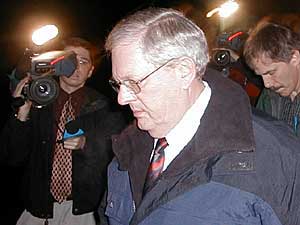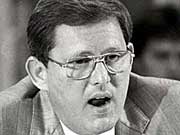The accident and the aftermath
January 21, 2004
 |
| Janklow leaving the courthouse after being found guilty of manslaughter in the death of Randy Scott. (MPR file photo) |
Sioux Falls, S.D. — "That's just Janklow" was a characterization that followed Wild Bill through his career. Some said it in affection. Some said it in frustration or anger. And some surely thought it on Aug. 16, 2003 in anger.
That day Janklow ran a stop sign at nearly 70 mph, right into the path of motorcyclist Randy Scott. Scott didn't have a chance. His cycle hit the car just behind the driver's door. His body struck the back of Janklow's borrowed Cadillac with enough force to tear open the trunk.
Shortly after his death, Randy Scott's friends held a motorcycle rally in his honor. Scott's family and friends were devastated. The Hardwick, Minnesota, farmer was a popular figure, and was always ready with a joke. Most of the people there, like Dick Lauseng, were bitter toward Janklow.
 | |||
"I remember years ago, when Janklow was governor, he wanted flashing lights on his vehicle so he could speed and stuff like that," Lauseng said at the time. "So apparently he loves speed. It just finally caught up with him. And it's too bad it was a bike. Too bad it couldn't be a semi."
A semi-trailer would have flattened Janklow.
Flandreau, South Dakota, Dec. 8, 2003. Reporters shout questions at Janklow as he leaves the Moody County courthouse in his hometown. Moments before, a jury had convicted him of manslaughter. Many on the jury knew Janklow personally.
After the accident, Janklow seemed a changed man. He'd suffered a head injury in the crash. At his first public appearance after the accident, he spoke slowly and seemed confused.
"I'm 64 years old. And I've never dealt with anything. You can't prepare in life to deal in life with the enormity of what I'm dealing with, and what I put other people through," Janklow said.
During that appearance Janklow misidentified the dead motorcyclist. Repeatedly, he called Randy Scott Mr. Robertson.
"There's no way that I know how to express the sadness and the sorrow and the grief that has been brought to Mr. Robertson's family. None."
 | |||
Janklow refused to talk about what happened that day, saying it was for the courts to decide. Some South Dakotans were upset that Janklow maintained his innocence in the face of the early evidence.
The criminal investigation brought more shocks. It documented that Janklow had long been just as aggressive on the highway as he had been in politics. He had received a dozen speeding tickets over a 10-year period. Once, he was clocked doing 100 mph. It also showed South Dakota police and state patrol officers regularly let Janklow go without a ticket, once they found out whom they had stopped.
His record made a mockery of words he had spoken during his state of the state message in 1999. He was arguing for stiffer criminal penalties, and used himself as an example of why stiff penalties deter criminals.
"Bill Janklow speeds when he drives. He shouldn't, but he does. And when he gets a ticket he pays it. If someone told me I was going to jail for two days for speeding, my driving habits would change. I can pay the ticket but I don't want to go to jail," Janklow said at the time.
Now he'll likely serve time for his manslaughter conviction -- up to 11 years.
|
He certainly has a future helping people. God's not done with him. And there a lot of us that know what a valuable asset he is.
- Jeremiah Murphy, Janklow friend |
During the trial it was clear South Dakotans lost faith in their pirate saint, who too often put himself above the law. Opinion polls showed most people wanted Janklow out of office. Hours after his conviction, Janklow resigned from the U.S. House. In a letter to constituents, he said it marked the end of his public life.
But his old friend Jeremiah Murphy wonders what may happen.
"He certainly has a future helping people. God's not done with him. And there a lot of us that know what a valuable asset he is. And we don't want that asset to ferment. We want it to stay active and grow. And we know it can," Murphy says.
As he walked down the courthouse steps in Flandreau after his conviction, Janklow looked beaten. He always knew his reckless and aggressive style carried risks. He once told a reporter, "people like what I do, but they don't like the way I do it."
Many were openly happy at Janklow's fall. The larger-than-life politician who behaved rashly, intimidated opponents and bent the rules, had finally been forced to live within the law.
Janklow didn't play to opinion polls, and he once said what's important to him is his own conscience -- how Bill Janklow judges Bill Janklow. Yet Janklow seems to have been too easy on himself. He was the delinquent who narrowly avoided reform school and entered the system. He was the lawyer who mocked criminals, but himself broke the law. When he had the chance to judge himself and change, he didn't.
He was reckless and got away with it -- was even loved for it -- until he took one risk too many and killed a man. He went from being a pirate saint to a simple outlaw.
|
News Headlines
|
Related Subjects
|

